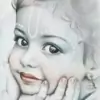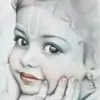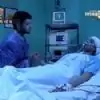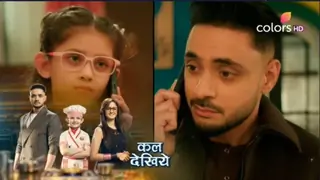"Kya baat hai, Panchaali?"
She paused for a few moments before responding. "Soch rahi hoon, Arya."
"Yeh to prateet hota hai, priye", he smiled that witty, knowing smile that she loved so much but saw so rarely. "Kintu kis vishay mein?"
"Aapke dharm ke vishay mein. Jab bhi mujhe lagta hai ki main usse samajhne mein saphal huyi hoon, aap aisa kuch karke mujhe phir se duvidha mein daal dete hain."
"Main kuch samjha nahin."
"Aapne us Duryodhan ke praan bacha liye!" She shifted about, then stood up as if to match her rising voice and began walking towards him. "Kabhi aap nyaay ko dharm kehte hain, aur kabhi kshama ko. Aap jaisa vyakti dharm ka itna uljha hua arth bataayega to saamaanya maanav usse kaise samjhenge?"
He sighed deeply. It was not an easy question, as his wife was too intelligent to ask those. Too well versed in... well, everything. "Kshama to hriday ka swabhaav hai, Panchaali. Niji dharm hai, apne hi santulan aur sthirta ko banaaye rakhne ke uddeshya se. Isi liye main kshama tyaag nahin sakta."
Her brows furrowed at his response. She understood his answer, but there was more to her question. "Aur nyaay ka kya sthaan hai is paristhiti mein? Kya aap Duryodhan ko uske apraadhon ka doshi nahin maante? Usne hum sab par atyachaar nahin kiye?"
He knew where she was coming from, and he didn't disagree. "Nyaay ka bhi apna mahatva hai, Panchaali. Woh samaajik dharm hai. Jo apraadh karta hai, usse dand milna hi chahiye. Yahi karm ka bhi vidhaan hai."
"To Gandharvon ka Duryodhan ko pakad lena kya uske karmon ka phal nahin, jo aapne usse mukt karva diya?"
"Nahin. Atyachaar usne humpar kiya." She noticed his fingers clench into a fist as he said these words before he took a sharp breath and relaxed his hand again. "Ab bhi hamein hi kasht pahunchaane ka uska lakshya tha, gandharvon ko nahin. Uska nyaay hum kshatriya ki bhaanti rannbhoomi par kar sakte hain. Yadi woh nihaththa bandi hai aur hum shastron se susajjit uspar vaar karenge, to hatyaare kehlaayenge, nyaayasheel nahin. Jab tak ranbhoomi mein usse saamna nahin hota, hum apna saiyyam nahin kho sakte."
She couldn't argue with this. It was in perfect harmony with what Govind advised, and she would never argue with Govind. Indeed forgiveness would free the one who bestowed it, allowing for him to proceed with his karma with a clear mind. And administering justice was a task for the hands; forgiveness could take place within the heart without preventing karma from its fulfilllment. She did not always hold this truth very dear, but that it was truth she could not deny. It was her turn to sigh as she thought to bring the discussion to a close. "Aap yathaarth keh rahe hain."
Yudhishtir knew his wife, though. The discussion clearly wasn't over, and he wouldn't let the night pass without at least trying to relieve her unease. "Abhi bhi asantusht ho. Koi aur prashna hai na man mein?"
Her eyes filled with sincerity rather than the heat of judgment as she continued. "Aapke saiyyam par mujhe koi sandeh nahin. Issi liye dyut ke samay aapke acharan par man mein baar baar prashna uthte hai." Her voice trembled as a result of both those haunting memories and her own confusion over how exactly that situation came about. "Aapko us tuchhya khel mein itni ruchi nahin ki anarth hone se pehle aap swayam ko rok na paaye. Mujhse adhik kaun jaan sakta hai aapke swabhaav ko? Aur main yeh sweekar nahin karti ki aap paason jaisi vastu par aasakt ho gaye."
A humorless, weary smile was on his lips. Whatever Vaasudev had said to her the day they returned from Hastinapur had such an impact on her, that rather than blame and disdain, he always heard empathy in her voice when she mentioned that unfortunate day. He thought blame and disdain would have been the better alternative as they would be a better match for how he felt about himself. This compassion was so undeserved that it ached him to hear it. "Yeh tumhaari mahaanta hai, Panchaali. Is prashna ka uttar to kadachit main bhi nahin de sakta ki us samay mere man mein kya tha. Itna hi keh sakta hoon ki jo tumne pehle puchha tha na, ki kya main Duryodhan ko doshi manta hoon? Us se kayi adhik main apne aap ko apraadhi maanta hoon us ghatna ke liye." He looked down at his hands, wringing them in one another. His eyes remained downcast as he spoke. "Is vanvaas ko prayaschit ke roop mein sweekar to kiya, par uske baad bhi main shayad kabhi apne aap ko kshama na kar paaun."
She did not want the conversation to go this way. It was bad for all of them if her eldest husband continued to retreat into his guilt instead of looking beyond themselves and into the future. She merely meant to help him analyze and root out his weaknesses instead of wallowing in their effects. And she meant what she said - she was certain that his weakness was not some trivial game. "Apraadhiyon ko aap kshama tab karte hain, jab aapko unke apraadh karne ka kaaran gyaat hota hai - daridrata, agyaan, aadi jo bhi ho. Apne aap ko bhi isi vidhi se samajhne ka prayaas karenge to hum dono ko apne prashna ka uttar mil jaayega."
He wasn't sure why her wisdom surprised him anymore, but it did. "Yathaarth keh rahi ho, Panchaali."
"To pratham charan se aarambh kijiye. Dyut ka nimantran."
He remembered that day all too vividly. No one else in the family was too keen on accepting the invitation, but he insisted. Afraid that the partition of the kingdom had spoiled his relationship with his uncle and eager to revive family ties, he hoped that a game between the cousins would do just that. Fortunate as he was in Indraprasth, he sorely missed the shelter of his elders' blessings. His memories of that optimism made this question easy to answer. "Woh to maine jyesht pitashri ka sanmaan karte huye sweekar kiya. Badon ki aagya paalne mein to laabh hi ho sakta hai."
A small smile played on her lips. His explanation was exactly what she thought it would be, and she knew exactly how to respond. "Tab to Bhaktishiromani Prahlad ko bhi Hari bhakti tyaagkar apne Pita ki hi pooja karni chahiye thi."
He fidgeted with bit of straw he had absent-mindedly taken into his hand. She had a point. "Jyesht pitashri Hiranyakashyap jaise nahin hai. Avashya unme kuch dosh hain, kintu kahin na kahin unme sneh bhi to hai na hamaare liye?"
Reawakening him to the truth about that man would hurt both of them, but she had to do it. "Kab dikhaaya unhone yeh sneh?"
"Woh jab... jab..." he began, but then fell into a sorrowful silence.
After what seemed like a lengthy pause, he picked up again. "Kintu sneh ke adhaar par hi dharm nibhaaya jaaye, yeh bhi to uchit nahin. Achhe ke saath to sabhi achhe rehte hai."
She put great effort into maintaining her composure as she kept up with the debate. Saiyyam, she reminded herself. When it came to that pathetic uncle, her wise husband was a naive child filled with blind reverence. She knew the man didn't deserve it and she was aware that Yudhishtir also knew - but she understood very well why he couldn't help but put him on a pedestal anyway. One's mind and one's heart cannot always be in sync. She hoped that if she helped him recognize his own subconscious motivations, he would eventually rise above them. "Achhaayi dikhaana aur baat hai, aur andhvishwaasi bankar har aagya ka paalan karna aur. Aapko in sambandhon se upar uthkar vyakti ke swabhaav ko pehchaanana bhali bhaanti aata hai, Aarya. Phir jyesht pitashri ke vishay mein aapki woh shakti kyun asamaarth siddh hoti hai?"
His lips were taut. He did not want to burden her with his emotions; she had much more to shed tears about. But his saiyyam failed him; his eyes welled up anyway. "Koi aur pita bhi to nahin jiske aashirwaad aur paraamarsh ke sahaare main chal sakun."
Her own face was streaked with tears. She knew it - that man took full advantage of her husband's longing for fatherly affection. He had lost his own father at such a young age, and while he tried to fill that void for his brothers to the best of his ability, he had no one to turn to himself. Only when they reached Hastinapur and he was introduced to his father's elder brother, whom Pandu had described to the children as his hero, did he feel that the void could be filled for him as well. If only he tried hard enough, showed enough respect and obedience, he would have a loving, protective father again.
As if he were reading her thoughts, he continued, "Dyut ke samay bhi sampoorn vishwas tha ki jab baat gambhir ho jaayegi to woh mere prati pitra dharm nibhaane par vivash ho jaayenge. Mujhe khel se uthne ki aagya de denge." His voice broke. "Us aagya ki pratiksha karte karte anarth hota raha, aur main maun rehkar dekhta hi reh gaya." His face was overcast with shame and self-loathing; he cried not out of grief but out of frustration with his own foolishness. "Apne pita samaan vyakti se pitra dharm ki aasha rakhte huye main apne bhaiyon ke prati apna pitra dharm aur tumhaare prati apna pati dharm bhool gaya. Mujhse apraadh na agyaan ke kaaran hua, na daridrata se. Moorkhta ki thi maine Panchaali, main kshama maange yogya bhi nahin hoon." He sunk to his knees and continued to weep.
She wiped her own tears before placing a hand on his shoulder. "Nahin aarya. Aapne moorkh nahin, abodh bankar apraadh kiya. Main aapko kshama kar chuki hoon; ab aapki baari hai." She looked into his eyes until he gathered the courage to meet hers and confirm that there was no anger there - only wisdom and understanding. "Kintu meri ek aur baat sun lijiye. Kshama paane ke liye apni bhool aur uske peeche chhupe huye kaaran ko samajhna avashyak is liye hai, ki aage chalke woh bhool sudhar jaaye. Pita ka dharm hota hai ki yadi putra doshi ho to usse sahi maarg dikhaaye, aur yadi sankat mein ho to uska rakshan kare." She waited for him to take a deep breath and show some sign of agreement. "Taatshri ne kabhi is dharm ka paalan nahin kiya, kyunki unhone aapke pita banne saubhagya kabhi sweekar hi nahin kiya. Is liye unke aadesh ya unki ichha ka aap par koi bandhan nahin." He glanced up at her with a mix of resolve and admiration, then gently wove his fingers through hers. He was determined to free his mind from fealty to the man who had proved to be blind of both body and soul. If he didn't consider Yudhishtir his son, he was not Yudhishtir's father.
She lifted her other hand to caress his cheek. She wouldn't let him go to sleep thus burdened with thoughts of isolation and hopelessness. He had nothing to worry about. "Kintu aap surakshit hai, yeh is baat ka pramaan hai ki aap anaath nahin. Aapka bhi koi pita swaroop rakshak hai."
His wife's words stayed with him, echoing in his ears as he slept and in the morning when he woke just before sunrise. He heard them again and again as he completed the day's chores. Did she mean Bhishma, or perhaps Vidur? He could think of no other elder who had actively worked to save them from harm's way. And yet, as she said, in the worst of circumstances they managed to remain unharmed. Someone was watching over them. These thoughts kept multiplying within his mind as he completed his morning chores outside the hut until suddenly, they were interrupted by a forceful utterance... "Bhiksham Dehi!"
------------------------------------------------------------------------------------------------------------





































